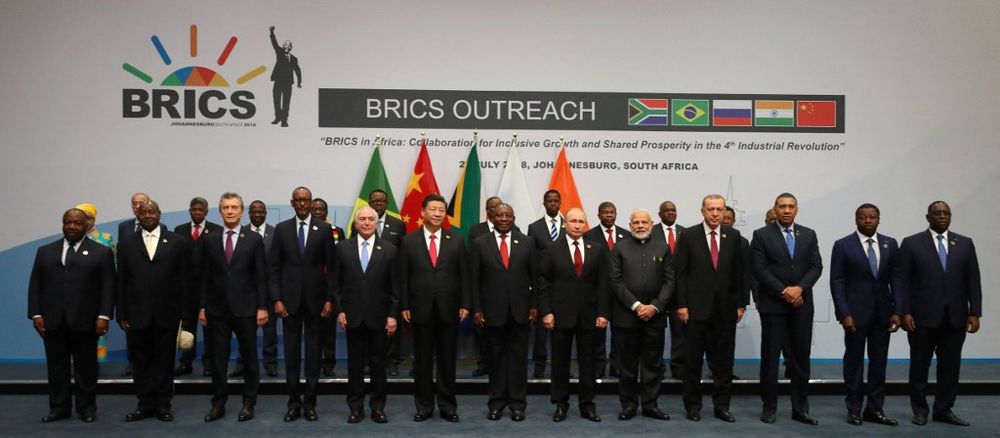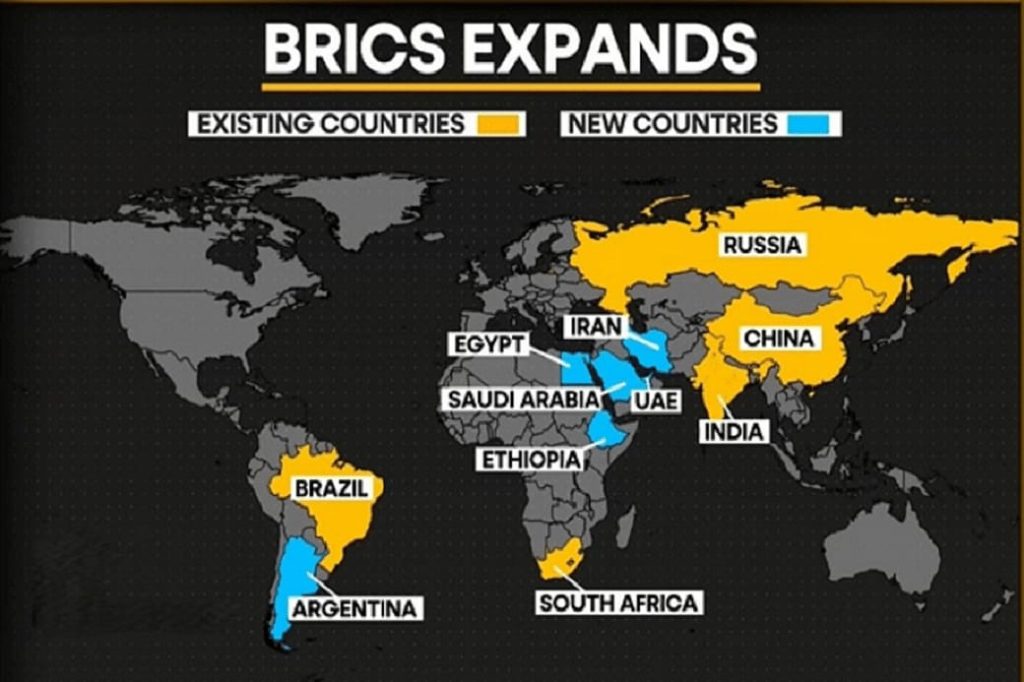Dr. Sayed Ghoneim, Fellow of Nasser’s Higher Military Academy, IGSDA Chairman
Argentina, Egypt, Ethiopia, Iran, KSA, and UAE will become members of BRICS on 01 JAN 2024.
The Institute for Global Security and Defense Affairs has received the following:
The President of South Africa, the current chairman of the BRICS summit, welcomed the expansion of the BRICS membership to include six other countries, namely Argentina, Saudi Arabia, UAE, Egypt, Iran and Ethiopia.
The expansion of the BRICS aims to reshape and build the voice of the Global South in the context of the polarization situation.
The members of BRICS see it as a “Like Minded Group”, that is, a group with similar ideas/ understandings. Whereas BRICS is not an alliance that is bound by the decisions of its members.
The main goals of the BRICS expansion are:
– Justice of the international system and reform of the multilateral system, that regime, if it existed, the Russian-Ukrainian war would not have broken out.
– Restructuring the global financial system.
– Easy access to development financing, which is considered high cost, and which international financing institutions are reluctant to do.
– Fighting the politicization of the trade exchange system.
Notes:
– 22 countries applied, and the BRICS agreed to invite (5) countries of them to join, in addition to one country that was invited without an official request from it, to be considered country No. (23) in the list of candidates, so that (6) countries are invited to join BRICS in this phase, pending an examination of the readiness of the rest to enter according to the criteria that will be approved later.
– All countries submitted official requests to join the BRICS, except for Saudi Arabia, which declared its willingness and desire only without submitting an official request, based on the principle of “I do not ask, but can be invited.”
– So far, the BRICS has not clarified specific criteria for selection, but the political and economic dimensions and geographical balance are definitely taken into account.
– India supported the membership of KSA, UAE and Egypt, in the time that India did not favor the three Arab countries countries because of their close relationship to China, but the fear of pressure from those three countries by constantly criticizing the violence of the Hindu Bharata group against Muslims in India.
– Egypt won the support of China, followed by the support of India, South Africa and Brazil. Russia refused to support Egypt’s membership due to its neutral instance in the Ukrainian war.
– It seems that Brazil has raised the problem that the membership of an Arab trio may push the BRICKS in the direction of regional Arab nationalist policies, which would be balanced by the membership of Iran.
As for the main challenges that may face the current BRICS approach, it is not expected that the BRICS will produce any nucleus for a new world order, politically or economically, for the following reasons:
– BRICS is basically an economic bloc that should focus on common interests, therefore, focusing on confront a common threat which is the hegemony of the US would be taking the block of BRICS as a security block, which might be taken as a strategic mistake, specially that founding and the newly joining countries of the bloc do not meet on a common security and political ground rather, some of those countries are likely to increase competition among them at various levels.
– Although the GDP of these countries combined constitutes a large proportion of the global GDP, the proportion of trade between them is not big enough compared with the total world trade.
– The Chinese currency is definitely globally considered the second powerful currency at the present time; however, it has one of the biggest reserves of the US dollars against the US itself, on the other hand none of the other founding countries of the BRICS possesses the economic capabilities that enable it to guarantee the rise of its currency, support one unified currency, or ensure the success of the idea of barter or dealing with the local operations of the bloc countries, compared to the strength and position of the US dollar, at least in the short and medium terms.
From the foregoing, the Institute for Global Security and Defense Affairs considers the following:
– The BRICS, although it brings together some of the largest economies in the world, they don’t have a common value project with a clear strategy and a tangible mechanism that is binding on its members and in a way that achieve clear common and balanced interests for them. It seems that it is based on reaching common threats and addressing them, such as: the dominance of the dollar, unipolarity, and the West’s insistence on imposing its values on the world.
– This expansion of BRICS annexed major allies of the US in an opposing camp to the US and Europe.
– The BRICS may offer to KSA and UAE a greater space of their presence globally and increase the chances of imposing their will through other poles rather than the US, in exchange for benefiting from their huge funds in supporting the development bank of the BRICS.
– Egypt, Ethiopia and Iran seek from their membership in BRICS to provide them with financing opportunities in the form of soft loans to implement development projects, as well as projects related to infrastructure. It will also allow trade exchange between them and all member states in local currencies, which would lead to the lack of control of a specific international currency, which is the US dollar. In addition to focusing on the process of partnership between member states in industrial and agricultural development projects, and other joint projects that achieve self-sufficiency in various commodities. On the other hand, BRICS will give these countries the opportunity to promote their international demands and objections, such as rejecting decisions that differ with their interests regarding global trade issues, compensation for climate damage such as carbon pollution, and contentious issues related to political and security matters with the US and Europe in varying files.







